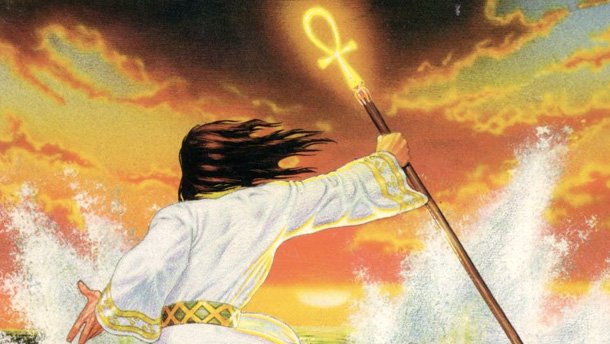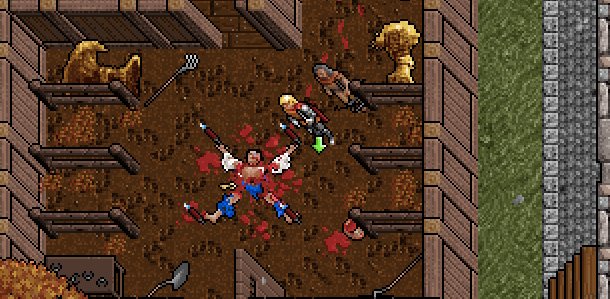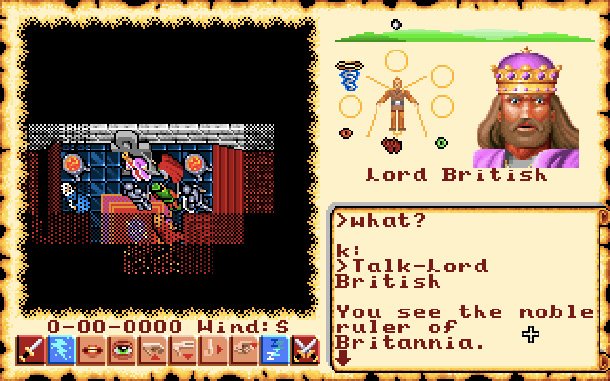Let's Reboot... Ultima

“Let's Reboot” takes a look back at a classic in need of a new outing or a beloved series gone stale and asks how it might be best redesigned or given a kick up the backside for today's gaming audience. The Rules: Assume a free hand, and a decent budget, but realistic technology and expectations. This week's sacred cow – the RPG with its sights set on honour... and eight other virtues too.
The next few months are either going to be really good, or really, really heartbreaking for Ultima fans. Officially on its way, we've got Ultima Forever , which will... ah... hopefully be better than it looks so far. Original creator Richard "Lord British" Garriott is also launching an independent revival of the series' core themes, if not the Ultima brand itself, with the online/offline Kickstarter project Shroud Of The Avatar: Forsaken Virtues . What neither of them are though is a classic RPG casually redesigned for the sake of a quick thought experiment. So, in the name of Britannia... Let's Reboot!

First up, our Ultima is going to be a single-player game - for a couple of reasons. First is the classic reason, that it makes it easier to be a hero. Second... the ethics of Ultima and the realities of online life are as bad a mix as an angry swarm of bees and an offensive balloon animal trying to live as roommates. Ultima was a series predicated on virtues of honesty and humility and valour and compassion. Ultima Online took that tradition... and became a charnel house nightmare. Subsequent attempts like A Tale In The Desert and Second Life haven't exactly convinced me that anonymity and virtual worlds are the best way to explore questions of honour rather than A/S/L.
(This is not to say I wouldn't like to see another big MMO pick up where Ultima Online left off, especially in terms of world simulation. It's just probably not the best way to do Ultima specifically.)
So, where do we begin? Quick primer. Simplifying things down for the sake of time, and ignoring things like the first three games, Ultima is the story of the Avatar - a regular guy (or gal, until the later games) from our world who gets repeatedly drawn into a land called Britannia to save it from destruction/moral collapse. He's the paragon of the Eight Virtues - Honesty, Compassion, Valor, Justice, Sacrifice, Honor, Spirituality and Humility - but importantly, just a regular guy. No superpowers, save being able to learn magic like anyone else over there. He has good friends, and a noble heart. That's all.

The moral collapses defined the Ultima quests as something more than just slaying monsters and rescuing princesses... ignoring the first at least, where you not only saved princesses, but at one point went into space to fight TIE Fighters. They were a little weird. As of Ultima V though, the pattern was there. IV in fact had no big threat, and was entirely about living up to the challenge of becoming the Avatar and embodying the virtues. V span that on its head, showing them corrupted by three figures called the Shadowlords to turn Britannia into a fascist state. VI was about racism and tolerance, in the wake of a mysterious gargoyle invasion. VII was an extended riff on groups like Scientology and how easily good works can be corrupted. Finally, VIII was about putting the Avatar into a situation where he had no choice but to allow the means to justify the end, and IX was a rancid pile of horseshit.
The biggest gaming news, reviews and hardware deals
Keep up to date with the most important stories and the best deals, as picked by the PC Gamer team.
What always fascinated me about Ultima though is that if you ignore taking out a couple of despots and their son in the first three games (assuming the Stranger of those games is also the Avatar - things are a little messy there), the Avatar is the worst thing that ever happened to Britannia.
This is never addressed in the game, but essentially the moment 'wise' Lord British put out a call for an Avatar, he doomed his entire world. Every single sequel - every single one - can be traced back to this one guy. The Shadowlords of Ultima V are the result of him vanquishing an earlier foe without cleaning up properly, the gargoyle invasion is his fault for dooming their homeland, and the dimension-conquering villain of Ultima VII-IX is literally his evil self, as split off and made super-powerful when he achieved Avatardom. In fairness, this wasn't actually the original plan for the trilogy, but it's canon now.
Even if we give Lord British the benefit of the doubt though, and say that something bad would probably have happened anyway, the concept still fails. The Avatar inspires faith and respect, but everything from the religious trappings surrounding him to the timing of his return means that it's mis-channeled. The Avatar is meant to be an example to actively live up to, not a symbol to worship. Over literally centuries of history - Britannian time being a little screwy - not one single other person manages to step up to the plate. We're not even really talking becoming a second Avatar. When the world is in peril, pretty much everyone just sits back and waits for a stranger from another one.
Our reboot is about someone else trying to become that hero. Not necessarily successfully.

